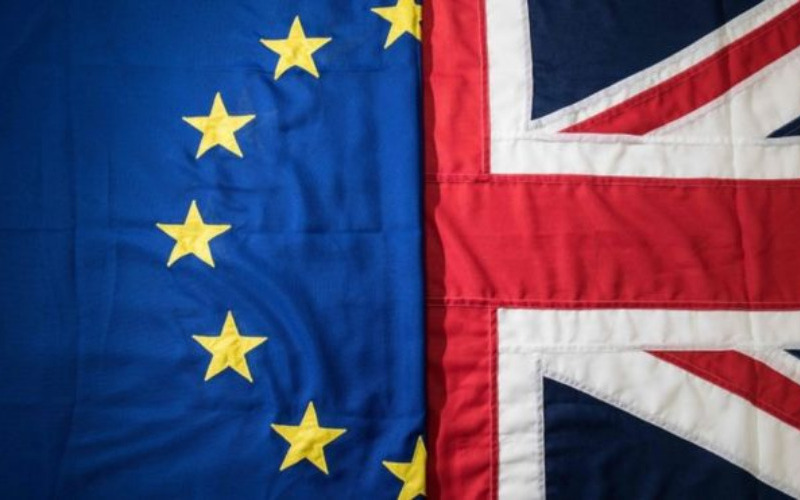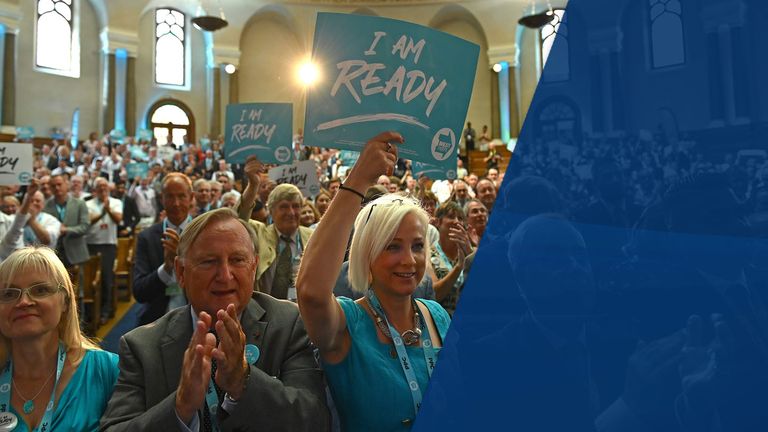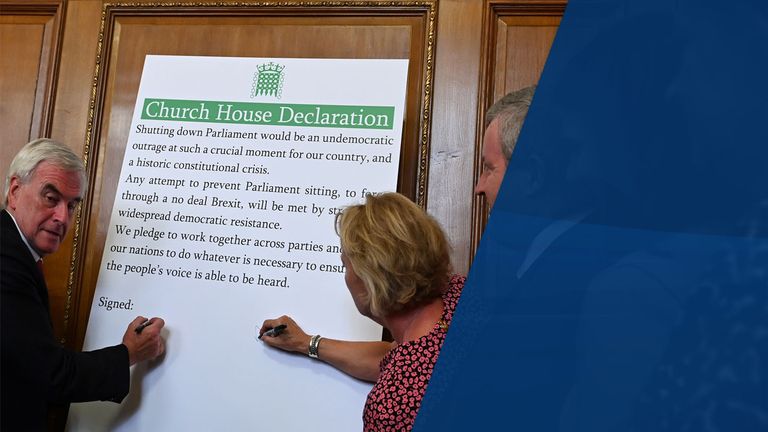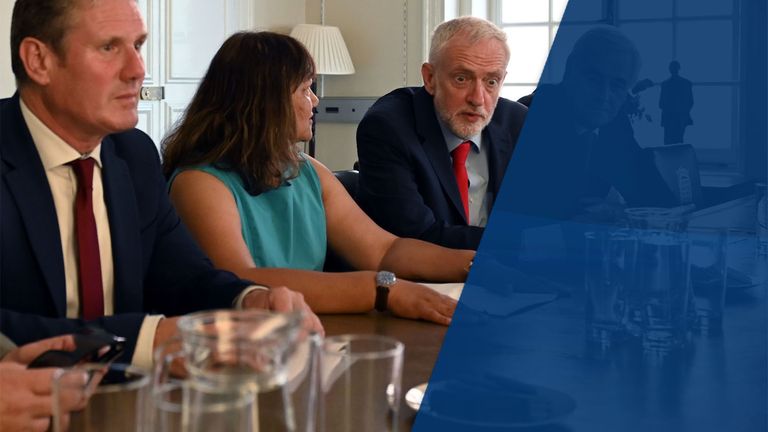There have been too many occasions over the last years where I've felt disturbed at the flow of British politics. Yesterday was one of them.
I attended two political events, organised by the two main Brexit camps; you finally got the sense over the past 24 hours of two rival armies coalescing, perhaps in their near final form.
On the one side, Remainers showed the first signs of the first modicum of unity, leaving the low disputes of high summer behind them, meeting together to seek ways to avoid a no-deal Brexit.
On the other, Nigel Farage gave his most profound hint yet of an electoral pact with the Conservatives if they pledge to deliver a no-deal Brexit.
Both groups lament and lambast the other.
But what struck me was how similar in some ways they were. Their fundamental diagnosis of British politics is the same.
Both use the language of coups, conspiracy and subterfuge. Both accused the other of orchestrating political chicanery to, in some way or other, suspend democracy itself.
The tragedy of British politics is that to some extent at least, both have a point, and the bigger tragedy still is that neither can recognise it, still less find some way to empathise with the other.
The two tribes which are crystallising in the Brexit endgame both represent different arms of recent British democratic history; the newer kid on the block, direct democracy (the referendum) with the Brexiteers and the much older, established representative democracy, championed by the Remainers.
The former is now unabashedly led by the government, augmented (or occasionally pricked by) Farage and his followers. Though some of the players involved are cynical ones, many others profoundly believe that their democracy is being subverted by political elites who never accepted the referendum result in the first place.
If Remainers were being honest, truly honest, I expect many could accept some truth in that critique. For many, it was a referendum they neither sought nor desired, a mechanism to nullify a dispute in a party for which (generally speaking) most cared little.
They thought and think the referendum was organised for petty reasons, and then carried out, potentially criminally.
Others believe that the British national interest is so undermined by Brexit, that it is so needlessly self-harming, that the political cost of ignoring the referendum is worth it. They do not accept its legitimacy and insofar as they do, they believe it is one which is waning with time.
Those who gathered yesterday did so in the name of averting a no-deal Brexit, but they know, as we all do, that their means of doing so is to have no Brexit at all.
Any one of those things, perhaps all, have virtue as arguments. But it is also inescapable that their fulfilment would mean the deliberate reversal of the biggest example of direct democracy for five decades.
It is quite literally the truth that certain political elites are seeking to overturn the referendum result. It is quite literally true.
It should be easy, even for ardent Remainers, to see and accept how that could be perceived by Brexit's proponents, including millions of ordinary people: a group of politicians seeking to get what they want over what they want. A subversion of democracy, the mutilation of a promise, the deployment of obscure parliamentary procedures, the seizure of control of the House of Commons from the government of the day, the potential emergence of a 'government of national unity' which attempts not to unite those who disagree with it, headed by a parliamentarian from the backbenches with precious little legitimacy; it is easy to see how this (or parts of it) could be seen as, a parliamentary 'coup'.
One need not agree with that description to see its force and how, linking A to B to C, many millions of our fellow citizens, might get there.
On the other hand, it is also clear that we have a government, the supposed custodians of our representative democracy, apparently happy to set it aflame.
The idle feckless talk of a prorogation to achieve its ends, hints that the government might not accept compulsion to seek an Article 50 extension even if it were so instructed, a willingness to entertain holding a general election after Brexit Day, a willingness to camp out in Downing Street even if an alternative government can be formed thus imperilling the Queen's neutrality.
There has been no norm too precious, no precedent too sacred, no part of our constitution too dear that this government has not been willing to abjure, or at least consider abjuring.
And then there is the embrace of no deal itself - the most extreme form of Brexit possible, a position bound to fray social and political bonds, something for which there is no democratic mandate, something which was not on offer during the referendum and indeed was ruled out by the Leave campaign as an impossibility.
This turn to extremity has been orchestrated by a small slice of parliament, a chunk of the Conservative Party which, for much of its history, has been considered extreme. It did so in defiance of the 2017 general election result, where no majority for the Conservative Party was delivered, mandated not by the public but by a tiny selectorate of Tory party members.
It should be easy, even for the most ardent Brexiteer, to see how and accept that could all be perceived by Brexit's opponents, including millions of ordinary people: a power grab with little legitimacy. A willingness to rip apart the warp and weft of our polity, the daily rules of our representative democracy which we deeply need and must cherish all in the name of getting what they want: a parliamentary 'coup' to suspend parliament and ignore its will.
One need not agree with that to see its force and see how millions of our fellow citizens, linking A to B to C might get there either.
Yet how often do you hear such empathy, such a willingness to step outside the thick mental cages of politicians and Brexit evangelists' own minds and place themselves in the shoes of the other?
Partly as a consequence of that, of a collective forgetting of how to talk to others who do not agree, both sides of the debate now genuinely believe a sort of coup is in progress. As I've indicated, following their own internal logic, it is easy to see how they reach that conclusion, however hyperbolic.
Before you get angry when you read this and splutter that there is no equivalence, that your side actually has right where the other has nothing but wrong, wait for a moment, and realise this is not the point of what I'm writing. The point is not who is right or wrong but the fact that both sides profoundly believe it, that a coup, the subversion of democracy is in progress, apparently in both directions, simultaneously.
In many ways that duality is more important than which side is just. It hints to the fact that this is a profoundly dangerous moment for British democracy.
The hallmark of failed states, of polities broken down, is when one or both sides start to believe political institutions have been captured by their opponents and will use them injudiciously, that proper political recourse has broken down, that politics cannot fairly arbitrate, when all legitimacy of political institutions - both direct and representative - is gone.
Both sides in Britain have begun to think this. And worryingly enough, I can see why they do.





 WhatsApp Us
WhatsApp Us